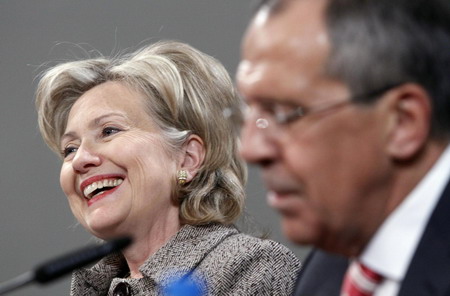Asia-Pacific
US, Russia to sign nuke-cut pact in two weeks
(Agencies)
Updated: 2010-03-25 05:25
 |
Large Medium Small |
|
 US Secretary of State Hillary Clinton (L) and Russia's Foreign Minister Sergei Lavrov attend a news conference in Moscow March 18, 2010. [Agencies] |
Maria Lipman, an expert with the Moscow Carnegie Center think tank, said this week the new treaty could not only reduce the size of both country's nuclear arsenals but also change the psychology of the US-Russia relationship, which has been strained for at least the past six years.
"Gradually the attitude may change to where America is not seen from Russia as a force to be treated with suspicion," she said.
"This agreement will set the stage for further cuts in US and Russian arsenals and multilateral negotiations for reductions by all nuclear weapons countries," Burt said.
Two senior US officials in Washington said the technical issues still to be resolved were in an "annex" to the main treaty, and they foresaw no hurdles to completing the entire deal within days. They spoke on condition of anonymity due to the sensitive discussions. One official said an announcement that the treaty is complete is expected by Friday.
A Kremlin source, speaking by telephone to The Associated Press, said all the documents, including the treaty, had been agreed upon. Russian Foreign Minister Sergey Lavrov said last week that the treaty was 20 pages long, with an extensive protocol attached.
Negotiations, which have been under way in Geneva since last spring, became bogged down in recent months on disputes over verification measures and Russia's objection to US missile defense plans for Europe.
Russian negotiators have balked at including some intrusive weapons verification measures in the new treaty. The Obama administration has warned that without these, Senate ratification could prove difficult.
The agreement would still leave each country with a large number of nuclear weapons, both deployed and stockpiled. Norris, the nuclear weapons expert, estimates that the US has 2,150 deployed strategic nuclear weapons and the Russians have about 2,600.
The expired START treaty, signed by Soviet President Mikhail Gorbachev and President George H.W. Bush, required each country to cut its nuclear warheads by at least one-fourth, to about 6,000, and to implement procedures for verifying that each side was sticking to the agreement. The 2002 Moscow Treaty lowered the warhead limit to 1,700 to 2,200.










